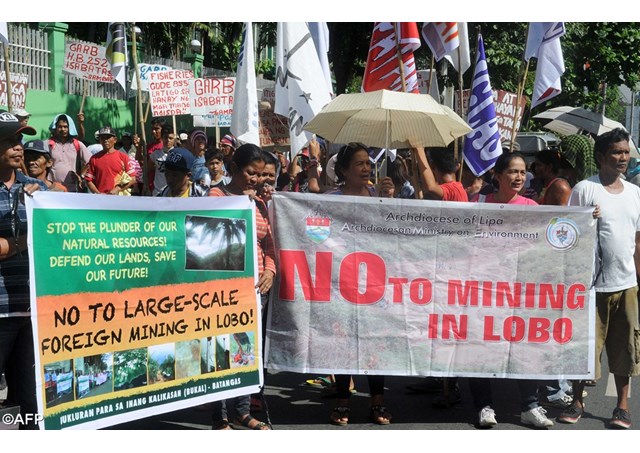
Philippines: Priests, nuns join resistance to mining project

(Vatican Radio) As of March 31, the provincial government of Batangas in the Philippines, has issued at least 10 permits to large-scale mining projects covering a total of 20,320 hectares of lands to Canada-Australia owned Egerton Gold Philippines Inc. and Mindoro Resource Limited.
On Thursday some 500 residents of Lobo town marched to Manila to show their opposition to the mining projects which are detrimental to the province’s last remaining ecological footholds.
"Everybody should be united to protect it," said Fr. Dakila Ramos, director of the Lipa archdiocese's Ministry on the Environment. "The people are against the project, but the government has endorsed the mining operation," the priest told ucanews.com.
The environmental group Kalikasan People's Network for the Environment noted that most of these lands are located in key biodiversity and environmentally critical areas, such as the town of Lobo.
In 1997, the town of Lobo was named in the top five of the 18 centers of biodiversity in the Philippines. In 2004, international scientists documented some 1,736 marine species in just one small section of the Verde Island marine biodiversity corridor across Lobo town.
"Large-scale mining involves deforestation and land clearing, flora and fauna will be surely lost and communities will be displaced in the development and commercial operation of the mining project," said Clemente Bautista of Kalikasan People's Network for the Environment.
"This will surely spell death to current marine conservation areas," he said, adding that the mining operation, which will use open-pit mining technology, will dump millions of metric tons of mine wastes into Lobo River down to the waters of the Verde Island Passage.
Petti Enriquez, secretary-general of the environmental activist group Bukal, said fisherfolks, peasants, and local businesses are at the "losing end" when the large-scale mining project starts to operate.
"Not only the fishery and agricultural sectors will be adversely affected, but also the booming tourism in the province," Enriquez said. He said the forests, farmland, and the sea in the province of Batangas are the source of livelihood, food security, and investment of many people.
"We will not take this sitting down, if needed we will fight tooth and nail to protect our land, livelihood and environment," he said.
Environment officials vowed to study the issue during a meeting with the protesters on July 16.
"The struggle is not yet over. We need to convince our government leaders," Ramos told ucanews.com after the meeting.
"What is in store for our fisherfolks and their families’ future once the mines poison our rivers and seas? What will happen to people whose fields will be inundated by mine waste?" the priest said.
He said loss of livelihood and worsening poverty are sure outcomes of this big mining project, "thus the Catholic Church will be a leading voice in opposing persistent attempts to plunder our environment and our people’s future."
Earlier this month, Church leaders in the province also launched the "One Million against Coal Campaign" to promote resistance to coal mines and the construction of coal-fired power plants in the country by gathering at least one million signatures.
Fr. Edwin Gariguez, executive secretary of Caritas Philippines, said it is necessary for the Church to be at the forefront of the fight against coal because the government "is adamant about pursuing the extension of these destructive operations".
(Source: UCANews)
| All the contents on this site are copyrighted ©. |


